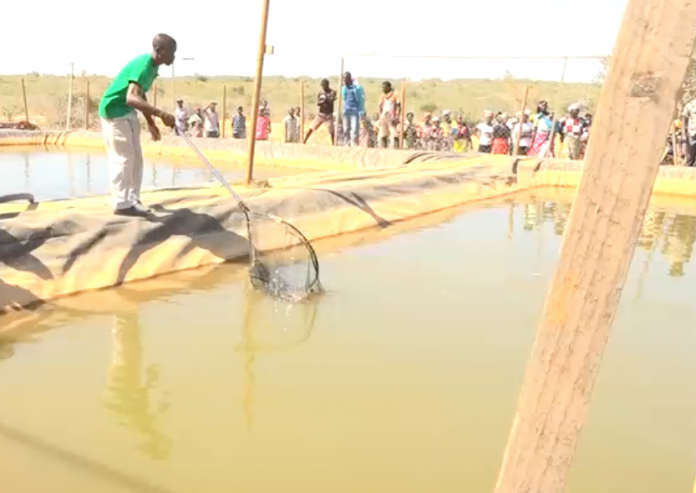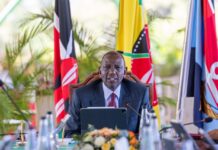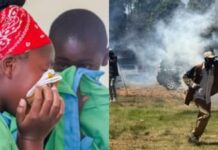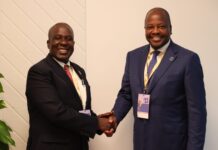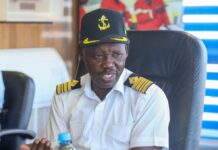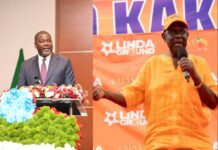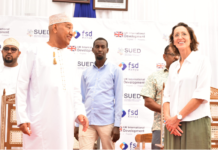Written By Ramadhan Kambi 📝
Kenya’s Arid and Semi-Arid regions might be headed for lucrative fish farming ventures if research is currently being undertaken by The Kenya Marine and Fisheries Research Institute (KMFRI) on fish farming in Arid and Semi-Arid Lands (ASALs) among other areas across the country bore fruits.
KMFRI Board Chairman John Safari Mumba said Monday that research had shown that the Blue Economy can benefit even areas with little or no rain as long as water is available.
Mr Mumba said this in the remote and dry location of Goshi in Ganze Sub County, Kilifi County, where he officially launched eight community fish ponds at Kavunzoni area where a Belgian charitable organization known as Kitanda sank a 130-metre borehole.
“From the research our experts have conducted here, we can confidently say that it is possible to practice the Blue Economy in ASAL areas as long as water is available,” Mr. Mumba said.
He said although KMFRI had conducted research and initiated fish farming in many parts of Kenya, the Kavunzoni fish farming project was the only one of its kind in ASAL areas.
KMFRI Director General Prof. James Njiru, said the community approached his organization after the water from the borehole was found to be saline so that it experts could conduct research on fish farming, and our researchers established that it was possible to do fish farming in the area.
“Our mandate is to provide the technical knowhow among the communities on the Blue Economy so that it can be practiced in the Coast region, and with a view to supporting Kenya’s Vision 2030,” he said.
Prof. Njiru said KMFRI had built a big station in Shimoni area of Kwale County to produce fish fingerlings and stop the reliance on wild catch found in the sea that has been used by many fish farmers in the region due to lack of properly researched fingerlings.
“The station will have enough research to enable us produce fingerlings that will be used in the Coast region,” he said.
The Director General said his the state corporation has other stations in Meru, Tharaka Nithi, Sagana and Turkana where the focus is on riverine and lake fisheries, noting that the Kavunzoni project is one of its kind in ASAL areas.
He said the fish farming projects carried out through the Economic Stimulus Project in the country between 2009 and 2013 did not succeed because there was no adequate research and communities did not embrace the projects.
Ganze MP Teddy Mwambire thanked KMFRI and the Kitanda organization for the water and fish projects and called upon the Kilifi County Government to partner with KMFRI in order to eradicate famine in ASAL areas.
“This project is an opportunity for us to start exporting fish from dry areas if the national and county governments will support a project like this one in Kavunzoni and therefore eliminate the perennial need for food relief supplies in the dry areas,” he said.
The chairman of the Kitanda organization from Belgium, Mr. Rudy Devinca, said his organization was moved by the lack of water in Goshi location as people were walking long distances in search of the precious commodity.
He said after consultation with local leaders and the community, the organization funded the construction of a water supply at about 100,000 Euros (about Sh12 million), but unfortunately the water that came out was saline.
“We came here a few years ago when we saw in what distress this community was; there was no water, there was no development possible and when we asked the people, they said there need was water,” he said.
He lauded the great cooperation his organization received from the locals and their leaders in realizing the success of the project, adding that although the water from the borehole is saline, the people can use it for washing and watering their animals, as well as fish farming.
A resident, Robert Chengo thanked the organization for the water project saying although the water was saline, it had made it possible for them to use it for washing as well as carry out fish farming through the guidance of KMFRI.
“We now have more that 7,000 fish which we have started harvesting and I am happy to see that we can grow fish in this area, an elated Chengo told journalists.
Kavunzoni village found in Mitangani location, Kilifi County is among the region getting little rainfall per year and the locals have to persevere long drought spells.









